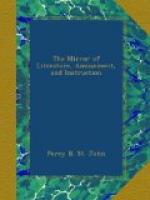and the Nortons,—whose White Doe, however,
has been immortalized by the poetry of Wordsworth,—can
any thing be more pregnant with romantic adventure
than the fortunes of the successive chieftains of
the lordly line of Clifford? Their first introduction
to the North, owing to a love-match made by a poor
knight of Herefordshire with the wealthy heiress of
the Viponts and the Vesys! Their rising greatness,
to the merited disgrace and death of Piers de Gavestone
and his profligate minions! and their final exaltation
to the highest honours of the British peerage, which
they have now enjoyed for five hundred years, to the
strong hand and unblenching heart with which they have
always welcomed the assaults of their most powerful
enemies! Of the first ten lords of Skipton castle,
four died in the field and one upon the scaffold!
The “black-faced Clifford,” who sullied
the glory which he acquired by his gallantry at the
battle of Sandal, by murdering his youthful prisoner
the Earl of Rutland, in cold blood, at the termination
of it, has gained a passport to an odious immortality
from the soaring genius of the bard of Avon.
But his real fate is far more striking, both in a
moral and in a poetical point of view, than that assigned
to him by our great dramatist. On the evening
before the battle of Towton Field, and after the termination
of the skirmish which preceded it, an unknown archer
shot him in the throat, as he was putting off his gorget,
and so avenged the wretched victims, whose blood he
had shed like water upon Wakefield Bridge. The
vengeance of the Yorkists was not, however, satiated
by the death of the Butcher, as Leland informs us that
they called him:—for they attainted him,
in the first year of the reign of Edward the Fourth,
and granted his estates, a few years afterwards, to
the Duke of Gloucester, who retained them in his iron
grasp till he lost them with his crown and life at
the battle of Bosworth. The history of his son
is a romance ready made. His relations, fearing
lest the partisans of the house of York should avenge
the death of the young Earl of Rutland on the young
Lord Clifford, then a mere infant, concealed him for
the next twenty-five years of his life in the Fells
of Cumberland, where he grew up as hardy as the heath
on which he vegetated, and as ignorant as the rude
herds which bounded over it. One of the first
acts of Henry the Seventh, after his accession to
the throne, was to reverse the attainder which had
been passed against his father; and immediately afterwards
the young lord emerged from the hiding place, where
he had been brought up in ignorance of his rank, and
with the manners and education of a mere shepherd.
Finding himself more illiterate than was usual even
in an illiterate age, he retired to a tower, which
he built in the beautiful forest of Barden, and there,
under the direction of the monks of Bolton Abbey,
gave himself up to the forbidden studies of alchemy
and astrology. His son, who was the first Earl




